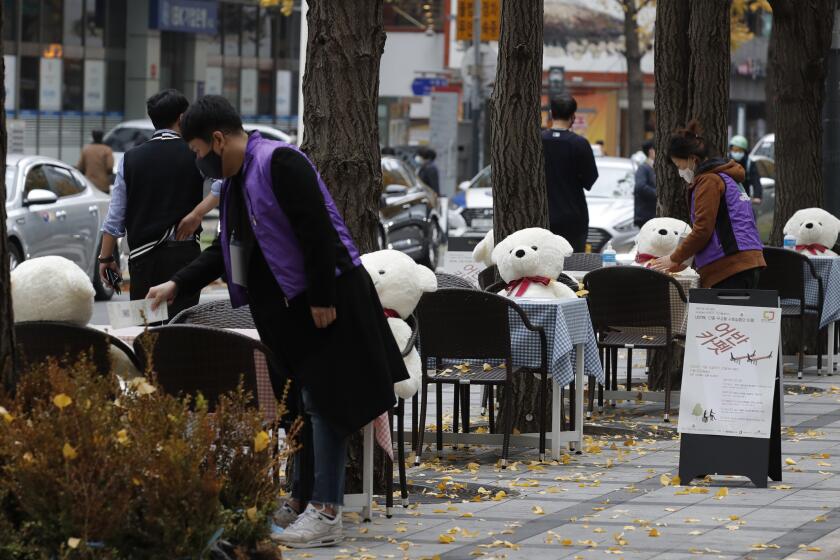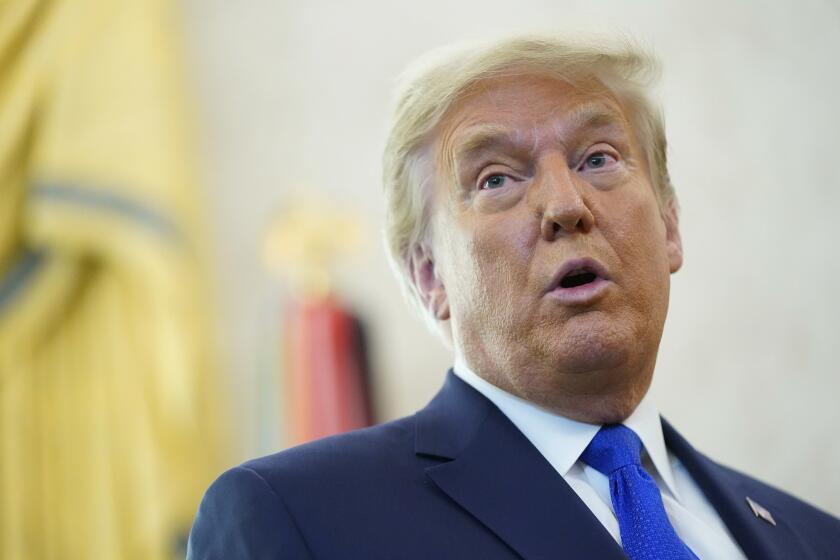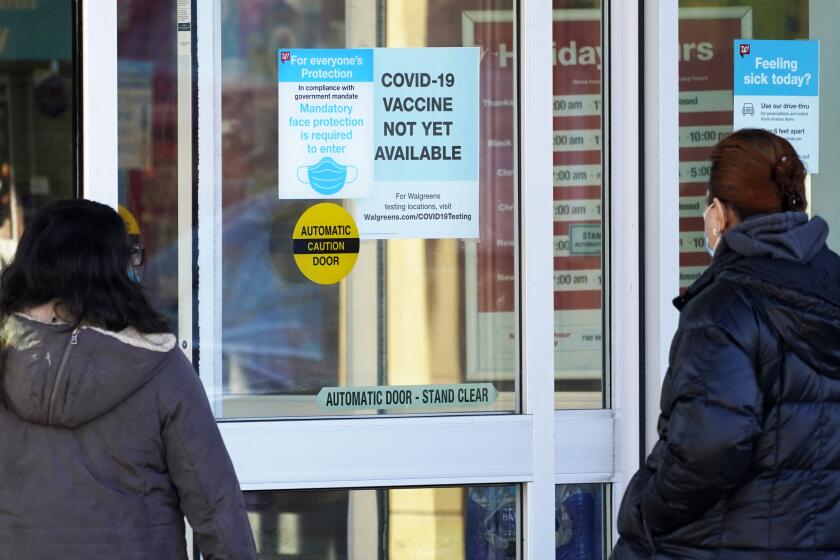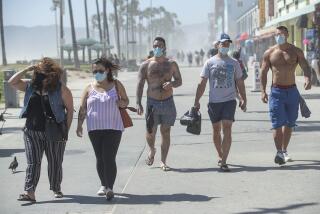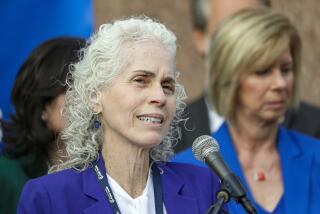Health officials harassed and threatened over masks as coronavirus grips smaller U.S. cities
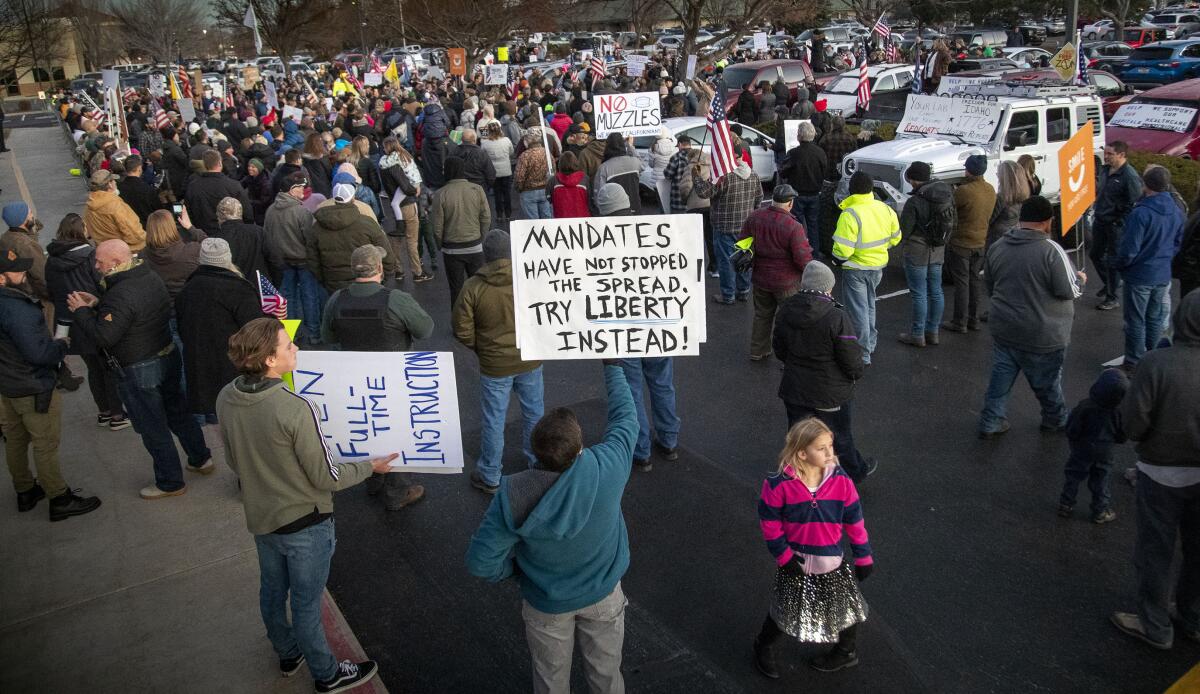
- Share via
KANSAS CITY, Mo. — Arguments over mask requirements and other restrictions have turned ugly in recent days as the deadly coronavirus surge across the U.S. engulfs small and medium-size cities that once seemed at a safe remove from the outbreak.
In Boise, Idaho, public health officials about to vote on a four-county mask mandate abruptly ended a meeting Tuesday evening because of fears for their safety amid anti-mask protests outside the building and at some of their homes.
One health board member tearfully announced she had to rush home to be with her child because of the protesters, who were seen on video banging on buckets, blaring air horns and sirens, and blasting a sound clip of gunfire from the violence-drenched movie “Scarface” outside her front door.
“I am sad. I am tired. I fear that, in my choosing to hold public office, my family has too often paid the price,” said the board member, Ada County Commissioner Diana Lachiondo. “I increasingly don’t recognize this place. There is an ugliness and cruelty in our national rhetoric that is reaching a fevered pitch here at home, and that should worry us all.”
Boise police said three arrest warrants were issued in connection with the demonstrations at board members’ homes.
In California, Sacramento County health officials had to suspend a meeting Tuesday after more than two dozen protesters pounded on the chamber doors during a debate over whether to strengthen enforcement against businesses that violate virus restrictions.
A South Korean study raises concerns that six feet of social distance may not be far enough to keep people safe from the coronavirus.
And in South Dakota, the mayor of Rapid City said City Council members were harassed and threatened over a proposed citywide mask mandate that failed this week even as intensive care units across the state filled with COVID-19 patients.
“I think that’s a sad commentary here in the middle of a global pandemic, the worst health crisis in our lifetimes, and we’re fighting over a mask,” Mayor Steve Allender said.
The tensions are flaring amid an epic surge across the U.S. in deaths, hospitalizations and infections over the last several weeks.
Deaths are running at more than 2,200 a day on average, all but matching the level seen during the spring’s peak in and around New York City. New cases per day have rocketed to more than 200,000 on average, and the number of patients in the hospital with COVID-19 stood at more than 106,000 on Wednesday, another all-time high.
Protesters in Montana’s Gallatin County have gathered for two consecutive weeks outside the Bozeman home of county health officer Matt Kelley to decry health regulations, including a statewide mask mandate. They have carried signs that read “We refuse to be your experiment” and “Oxygen is essential.”
Last week, around 80 people lined Bozeman’s Main Street to support Kelley and other health officials.
In Montana’s Flathead County, where officials recorded 17 coronavirus-related deaths over 18 days and resistance to masks runs strong, the interim public health officer is resigning when her contract is up at the end of the year, citing a lack of support from city and county authorities for measures to control the scourge.
In Helena, Republicans who control both chambers of the Montana Legislature denied a request by Democratic lawmakers to require masks be worn inside the capitol during the legislative session next month.
In Missouri, Greene County officials recorded 51 COVID-19 deaths in the first eight days of December as hospitals overflow and hundreds of healthcare workers are quarantined. The area’s two major hospitals asked the city of Springfield, the county seat, to renew the city’s mask mandate before it expires in January. The county itself does not have a mask mandate, nor does the state.
As the deaths pile up, Springfield Mortuary Services owner Brian Simmons is overseeing the embalming and cremation of COVID-19 victims as his own 48-year-old daughter battles the virus. She spent the past week hospitalized on a ventilator in one of the city’s overwhelmed hospitals.
“You are just helpless,” he said. “There is nothing you can do about it. We haven’t seen her since she’s gone in.”
In Idaho, hospital officials have repeatedly warned they are becoming overwhelmed and could be forced to implement “crisis standards of care” — that is, reserve lifesaving treatment for patients most likely to survive. Idaho health authorities reported more than 2,200 new cases Wednesday and a running death toll of at least 1,103.
South Dakota has suffered through the country’s worst rate of COVID-19 deaths per capita over the last week, but Gov. Kristi Noem has been ardent in her opposition to mask mandates or other aggressive efforts to slow infections.
That hands-off approach drew vocal support at Rapid City council meetings, even as doctors warned that the only large hospital in the western half of the state is facing a crisis and patients are being flown out of the state. The meetings drew hours of testimony from people who said that the dangers of the virus are overblown and that mask requirements violate their liberties.
The Trump administration opted last summer to pass up the chance to buy millions of additional doses of one of the leading coronavirus vaccine contenders.
Dr. Stephen Neabore, a physician with the biggest hospital system in the region, said he has been frustrated as he tries to persuade people to wear masks. After working in New York City and studying medicine in England, he said, he sees a distinct skepticism toward government around him.
“I still see people out here that will tell me that they don’t believe it’s any worse than a common cold,” he said.
Coronavirus deaths have also been rising rapidly in rural parts of Iowa, where many people disdain masks. Among the hardest hit is O’Brien County, population 13,800, where 42 deaths have been blamed on the virus.
Ty Rushing, who covers the region as managing editor of the Northwest Iowa Review newspaper, said he thought the June death of 63-year-old James Fischer, a milk hauler who lived in Sheldon his whole life, would be a wake-up call to take the virus seriously.
But he said obituaries in his newspaper have only been piling up since then. The recent deaths include Fischer’s mother, who like many other COVID-19 victims died at a nursing home.
As states frantically prepare to begin months of COVID-19 vaccinations, a new poll finds only about half of Americans are ready to roll up their sleeves.
“It’s sad to say, but I think people are just numb to it or they are sticking their head in the sand about it,” Rushing said. He said some have reacted to the deaths of the elderly with the attitude: “Well, they were going to die anyway. Oh, they are older and there’s underlying conditions.”
In Iowa’s Harrison County, 47 deaths have been attributed to the virus out of a population of about 14,000. Most of the deaths have resulted from outbreaks at nursing homes in the small towns of Dunlap, Logan, Missouri Valley and Woodbine.
Dunlap City Clerk Meredith Van Houten said almost everyone in the town of about 950 people has a connection to those who have died. She said that she knew some from handling their water bills at City Hall and that another of the dead was her old neighbor.
“It’s a horrible time right now,” Van Houten said.
More to Read
Sign up for Essential California
The most important California stories and recommendations in your inbox every morning.
You may occasionally receive promotional content from the Los Angeles Times.
